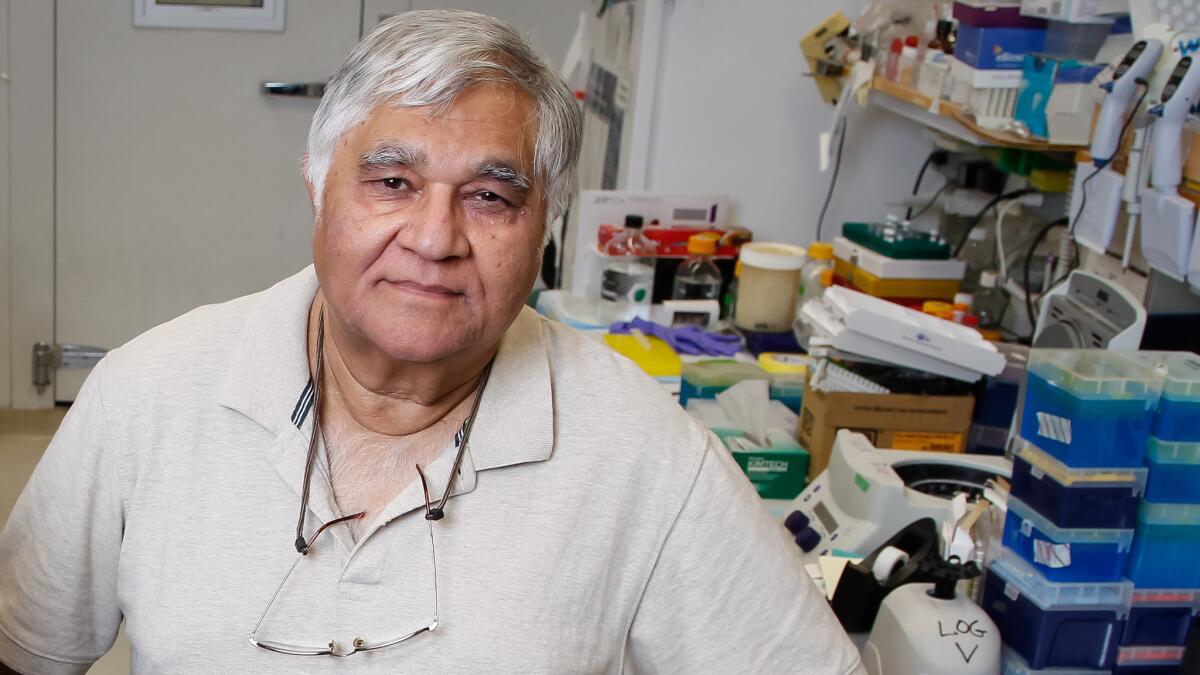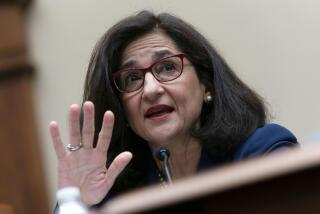Renowned Salk Institute scientist loses a top post due to gender discrimination claims

Reporting from LA JOLLA, Calif. — A renowned cancer expert at the Salk Institute for Biological Studies in La Jolla has been ousted as editor of one of the world’s top science journals after being implicated in a deepening controversy over how the center treats female faculty.
Inder Verma confirmed to the San Diego Union-Tribune that he has been placed on temporary leave as editor of the Proceedings of the National Academy of Sciences (PNAS), effective Jan. 1.
He said the move stems from lawsuits that Salk professors Vicky Lundblad, Katherine Jones and Beverly Emerson separately filed in July, alleging that the institute systemically discriminates against women in pay, promotions and access to grants and potential donors.
Salk President Elizabeth Blackburn has said the allegations are untrue, but the lawsuits apparently factored in her decision to announce last week that she will retire as president late next summer, after barely two and a half years on the job.
Earlier, Ted Waitt, chairman of the board of trustees, also unexpectedly announced that he was retiring from his position.
Blackburn, who is a Nobel laureate, could not be reached for comment about a controversy that has overshadowed the research the Salk Institute does on cancer, diabetes, Alzheimer’s and other diseases. The institute’s achievements include helping to develop the cancer drug Gleevec.
The controversy also has raised questions about whether the allegations will make it difficult for the Salk Institute to recruit high-quality scientists and executives.
Verma has been a bit more public about recent events.
He told the Union-Tribune that he sent an email to the editorial board of PNAS that states:
“I am writing to let you know that the NAS Council has decided to place me on temporary leave as Editor-in-Chief of the Proceedings of the National Academy of Sciences, effective January 1, 2018 and until the resolution of the employment-related lawsuits filed against The Salk Institute of Biological Studies, where I am a Professor.
“Being part of the NAS family and having the privilege of serving as the PNAS Editor-in-Chief have been among the great honors of my career.
“As you can imagine, the Council’s decision saddens me deeply, particularly because the lawsuits have nothing to do with my work with NAS and I am not named individually for any claim.
“That said, I recognize the sensitivities present in this current environment and have far too much esteem for NAS to risk the possibility that events related to Salk would in any way distract from the Academy’s extraordinary work, so I will gracefully step aside. I very much look forward to working with you all again, hopefully soon.”
Lundblad did mention Verma in her lawsuit, saying that he was one of the leaders who made it difficult for women to succeed at the Salk Institute. At the time, Verma told the Union-Tribune that he was not aware that a lawsuit had been filed.
The 70-year-old Verma joined the Salk faculty in the 1970s and rose to international acclaim, notably for his insights about oncogenes, or genes that have the potential to cause cancer. His basic research has helped advance gene therapy, which involves altering a person’s DNA to prevent or treat disease. Gene therapy is currently one of the hottest fields in science and medicine.
His broad expertise in genetics and cancer is among the reasons he was appointed editor of PNAS, which is more than a century old and was previously edited by people who had, or would, win the Nobel Prize, including Linus Pauling, Robert Millikan, Randy Schekman and Wendell Stanley.
Verma became the journal’s editor in 2011 and has held the position while continuing to run his genetics laboratory.
Verma said he has been largely unaware of many of the changes that have been occurring at the Salk Institute lately.
“Both Dr. Blackburn`s and Ted Waitt’s decision for unexpected retirement were as much surprise to me as perhaps to you or others,” Verma said in an email. “I have had no chance to talk to either one of them, so your guess [about why they’re leaving] is as good as mine …”
Robbins writes for the San Diego Union-Tribune.
Robbins writes for the San Diego Union-Tribune.
More to Read
Sign up for Essential California
The most important California stories and recommendations in your inbox every morning.
You may occasionally receive promotional content from the Los Angeles Times.










